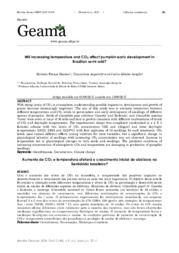Will increasing temperature and CO2 affect pumpkin early development in Brazilian Semi-Arid?
Will increasing temperature and CO2 affect pumpkin early development in Brazilian Semi-Arid?
Author(s): DANTAS, B. F.; ANGELOTTI, F.; ARAGÃO, C. A.
Summary: With rising levels of CO2 in atmosphere, understanding possible impacts on development and growth of plants becomes increasingly important. The aim of this study was to evaluate interaction between different temperatures and CO2 levels in germination and early development of seedlings of different species of pumpkin. Seeds of Cucurbita pepo cultivars ?Caserta? and ?Redonda?, and Cucurbita maxima ?Coroa? were sown in trays of 36 cells and held in growth chambers with different combinations of levels of CO2 and day/night temperatures. The experimental design was completely randomized in a 2 X 3 factorial scheme with two levels of CO2 concentration (360 and 550ppm) and three day/night temperatures (26/20, 29/26 and 32/26°C), with four replicates of 18 seedlings for each treatment. CO2 levels used caused different effects among cultivars for most variables, but a significant change in physiological behavior of seedlings with increasing CO2 concentration was not observed. Increase in temperature led to physiological changes in both seeds and seedlings. The predicted conditions of increasing concentration of atmospheric CO2 and temperature are damaging to production of pumpkin seedlings
Publication year: 2017
Types of publication: Journal article
Unit: Embrapa Semi-arid Region
Observation
Some of Embrapa's publications are published as ePub files. To read them, use or download one of the following free software options to your computer or mobile device. Android: Google Play Books; IOS: iBooks; Windows and Linux: Calibre.
Access other publications
Access the Agricultural Research Database (BDPA) to consult Embrapa's full library collection and records.
Visit Embrapa Bookstore to purchase books and other publications sold by Embrapa.

